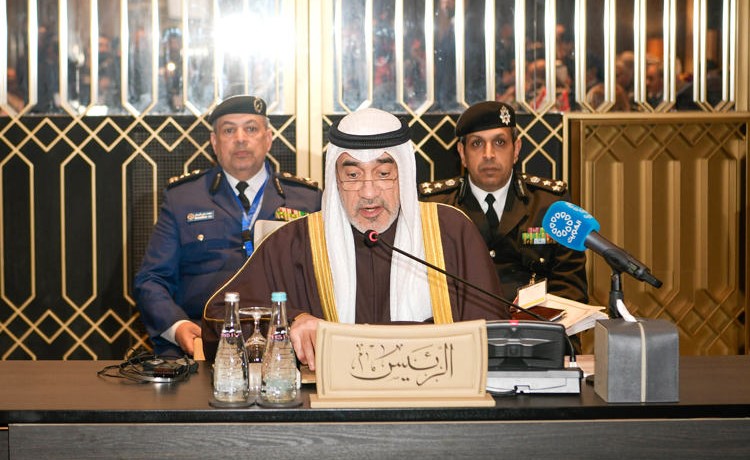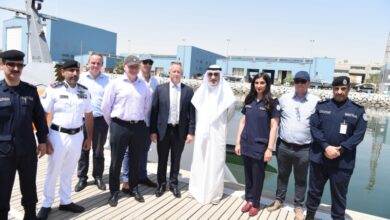Kuwait Declaration is a bold step towards disaster resilience in Arab world, says Sheikh Fahad Al-Yousef
The Acting Prime Minister and Minister of Interior stated that the declaration urges active support for Palestinian government efforts in rebuilding Gaza Strip and the West Bank, coordinating with regional and international organizations through Gaza’s relief and recovery plan.

• Sheikh Fahad Al-Yousef expressed his hope that the Kuwait Declaration would support all Arab countries in addressing disaster risks and contribute to achieving the Sendai Framework for Disaster Risk Reduction 2030, ensuring security and safety across Arab and Islamic nations.
The Sixth Arab Regional Forum for Disaster Risk Reduction, chaired by Acting Prime Minister and Minister of Interior Sheikh Fahad Al-Yousef, concluded with the launch of the Kuwait Declaration, co-drafted by experts and officials from Arab countries, Al Anba reported.
During the closing session, Forum Speaker Sheikh Fahad Al-Yousef expressed his hope that the Kuwait Declaration would support all Arab countries in addressing disaster risks and contribute to achieving the Sendai Framework for Disaster Risk Reduction 2030, ensuring security and safety across Arab and Islamic nations.
Ministers, heads of delegations, and representatives of Arab UN member states, along with local, regional, and international governmental and non-governmental organizations participating in the forum, emphasized in the Kuwait Declaration the urgent need to provide essential support to Arab countries affected by the Israeli occupation, particularly Palestine.

The declaration calls for active contributions to Palestinian government efforts in reconstructing affected areas in Gaza and the West Bank, in coordination with regional and international organizations through the relief and early recovery plan for Gaza.
Increasing frequency and severity of disasters
Recognizing the increasing frequency and severity of disasters and their significant human and economic toll, they underscored the impact on sustainable development goals in the Arab region.
They also reaffirmed the importance of the Sendai Framework for Disaster Risk Reduction (2015-2030), the Arab Strategy for Disaster Risk Reduction 2030, and previous regional and international declarations, including the UN General Assembly’s high-level political declaration on the mid-term review of the Sendai Framework.
They reaffirmed their full support for shifting from disaster management to comprehensive disaster risk management, aligning practices with sustainable development policies and the priorities of the Sendai Framework 2015-2030.
In the declaration, they emphasized the importance of leveraging resolutions from the Climate and Desertification Summits, including climate finance mechanisms, to enhance prevention, preparedness, response, and recovery from disasters in the Arab region.
They highlighted the need for greater coordination and consultation among Arab countries through the Arab Coordination Mechanism for Disaster Risk Reduction (ACMDRR) to align efforts with regional and global strategies. They also commended the Arab League’s role in this field and recommended including disaster risk reduction on the agenda of all ministerial councils to strengthen risk governance and resilience.
The declaration stressed the importance of a comprehensive, inclusive approach involving governments, civil society, academia, youth, vulnerable groups, the private sector, and the media in reducing disaster risks across Arab societies. It also called for utilizing the findings of a study by the Arab Network for Environment and Development (RAED) on disaster-induced displacement in the Arab region.

The Kuwait Declaration urged greater use of science, technology, and innovation to improve risk assessment and early warning systems, as well as the implementation of outcomes from the Arab-African Conference for Science and Technology for Disaster Risk Reduction (Tunis-2023). It also supported the Arab Consultative Group on Science and Technology for Disaster Risk Reduction in providing scientific insights and technical advice to decision-makers to enhance regional and national disaster risk reduction efforts.
The declaration urged adopting the UN disaster loss accounting system, boosting disaster risk reduction investments, strengthening public-private collaboration, and supporting countries in accessing international financing, climate change mitigation programs, and green finance to enhance resilience and sustainable development.
Additionally, it requested that the Technical Secretariat of the Arab Coordination Mechanism for Disaster Risk Reduction under the League of Arab States prepare a draft study on establishing an Arab Crisis Center for Crisis Response and Disaster Management.
Strengthening governance and disaster risk management
At the end of the forum, the Kuwait Declaration called on Arab governments, partners, and stakeholders to accelerate the implementation of the Sendai Framework for Disaster Risk Reduction, the Arab Strategy for Disaster Risk Reduction, and the outcomes of regional and international declarations.
It also emphasized the implementation of the political declaration issued during the high-level meeting of the United Nations General Assembly on the mid-term review of the Sendai Framework. The declaration urged efforts to strengthen governance and disaster risk management by establishing and enhancing clear coordination roles and mechanisms among stakeholders at local, national, and regional levels.
Financial investments in disaster risk reduction
It also called for greater financial investment in disaster risk reduction, resilient infrastructure, and public-private partnerships, along with updated disaster loss databases. It also emphasized risk analysis to support evidence-based policies and enhance decision-making for effective disaster management.
Utilizing advanced technologies
The declaration further highlighted the importance of utilizing advanced technologies, including geospatial tools, data analysis, and artificial intelligence, to improve risk mapping and early warning systems. It also underscored the implementation of the outcomes of the Arab-African Forum for Science and Technology and emphasized the necessity of holding the forum regularly every two years.
Reducing disaster risks
The Kuwait Declaration also called for strengthening cooperation among stakeholders to implement innovative solutions, including nature-based solutions for disaster risk management. It emphasized the need for periodic reviews of progress in implementing the Sendai Framework and the Arab Strategy for Disaster Risk Reduction. Additionally, it highlighted the importance of enhancing the role of governments and local bodies in responding to and reducing disaster risks—whether from natural or man-made hazards—within the framework of national disaster risk reduction strategies.
Major General Talal Al-Roumi, head of the Kuwait Fire Force, read the Kuwait Declaration on behalf of the ministers and heads of the participating delegations.















